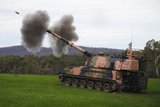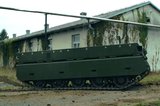Estonia orders Israeli mortars
Spear Mk II 120mm mortar system. (Photo: Elbit Systems)
The Estonian National Defense Investment Centre has ordered 120mm mortars from sole bidder Elbit Systems of Israel, under a framework agreement worth up to €15 million ($17.27 million).
The contract was awarded on 30 September but it was formally announced on the EU contracts database on 10 November.
As well as an undisclosed number of 120mm mortar systems, Elbit will also provide lifecycle support for the Estonian Army.
Elbit produces two types of crew-served towable 120mm mortar, either of which can be operated with a light handheld fire-control system.
Shephard reported in late October that the 2022 Estonian defence budget allocates funding to procure 4x4 vehicles. A potential candidate is the Oshkosh Joint Light Tactical Vehicle, which can function as a self-propelled mortar carrier when fitted with the Elbit Spear 120mm crew-served system.
Elbit also produces the 120mm Cardom autonomous self-propelled recoiling mortar with auto-laying capabilities.
More from Land Warfare
-
![World Defense Show 2026: Hanwha increases Middle East presence and reveals Tigon 6x6 sale]()
World Defense Show 2026: Hanwha increases Middle East presence and reveals Tigon 6x6 sale
Shephard sat down with Hanwha Middle East and Africa president Sung Il at World Defense Show 2026 to hear about the company’s plans for the region and how it plans to use local industry success to win deals.
-
![Estonia builds Asia-Pacific links as it looks to scale defence industry capabilities]()
Estonia builds Asia-Pacific links as it looks to scale defence industry capabilities
Collaboration between Estonian defence companies and well-aligned firms in Asia-Pacific will form a key part of Tallinn’s ambitions to significantly grow its defence industrial base.
-
![World Defense Show 2026: DOK-ING working on MV-8 variants and reveals specs ahead of Eurosatory]()
World Defense Show 2026: DOK-ING working on MV-8 variants and reveals specs ahead of Eurosatory
The Croatian company began the development of the MV-8 modular uncrewed platform in the early 2020s. Specifications for the vehicle were revealed to Shephard at World Defense Show 2026.
-
![World Defense Show 2026: Turkish and European industries will cooperate, says Aselsan boss]()
World Defense Show 2026: Turkish and European industries will cooperate, says Aselsan boss
Aselsan was formed 50 years ago in response to difficulties Turkey was facing in sourcing major systems internationally. While some challenges still remain, company president Ahmet Akyol believes a rapprochement is possible.
-
![World Defense Show 2026: MARSS displays new Nation Shield air defence C2 system]()
World Defense Show 2026: MARSS displays new Nation Shield air defence C2 system
Nation Shield is the latest iteration of the MARSS C2 system and is designed to provide C2 further forward along with more capable air defence.






















